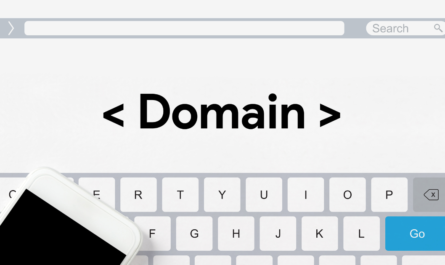In the ever-expanding digital landscape, domain names play a crucial role in establishing a strong online presence. With the introduction of new top-level domains (TLDs), such as .blog, website owners and bloggers now have an opportunity to secure a domain extension that specifically caters to their blogging needs. In this article, we will explore everything you need to know about .blog domains, including their benefits, registration process, and how they can enhance your blogging journey.
What is a .Blog Domain?
A .blog domain is a top-level domain (TLD) extension specifically designed for bloggers and individuals passionate about sharing their thoughts, experiences, and expertise through online content. The .blog TLD provides a unique and relevant domain extension that instantly communicates the purpose of the website to both visitors and search engines.
Benefits of Using a .Blog Domain:
- Instant Recognition: The .blog extension immediately identifies your website as a blog, making it easier for visitors to understand the nature of your content. It helps establish credibility and creates a memorable online identity.
- Branding Opportunities: A .blog domain allows you to align your domain name with your blog’s focus or niche. It provides an opportunity to create a strong brand identity and a sense of authority within your specific blogging community.
- Enhanced Search Engine Visibility: Search engines often consider domain extensions as a factor when determining the relevance and credibility of a website. Having a .blog domain can potentially improve your website’s visibility in search engine rankings for relevant blogging-related keywords.
- Availability and Unique Name Selection: As .blog domains are relatively new, it offers a higher chance of finding your desired domain name without having to compromise by adding unnecessary numbers or hyphens. You can select a unique and memorable domain name that reflects your blog’s content and objectives.
- Community and Networking: By using a .blog domain, you automatically become part of a community of bloggers who share a similar passion for content creation. This can lead to networking opportunities, collaboration, and exposure to a wider audience within the blogging community.
Registering a .Blog Domain:
Registering a .blog domain is a straightforward process, similar to registering any other domain name. Follow these steps:
- Choose a Domain Registrar: Select a reputable domain registrar that offers .blog domain registration services. Ensure that the registrar is accredited and authorized to sell .blog domains.
- Search for Availability: Use the registrar’s search function to check the availability of your desired .blog domain name. You can continue with the registration process if the domain name is available. If not, try different variations or consider using domain suggestion tools to find alternative options.
- Provide Registration Details: Enter your personal or business information as required by the registrar. This typically includes your name, address, email address, and payment details. Make sure the data is correct and current.
- Complete the Registration: Review the registration details, including the domain name, registration period, and associated costs. Confirm the registration and complete the payment process. For future use, keep a copy of the registration confirmation.
Managing and Setting Up a .Blog Domain:
Once you have registered your .blog domain, you can proceed with setting up your website and configuring your domain settings. Here are the basic steps:
- Choose a Website Hosting Provider: Select a reliable website hosting provider that offers blogging platforms or content management systems (CMS) suitable for your needs. Consider factors such as performance, security, scalability, and ease of use.
- Configure DNS Settings: Access your domain registrar’s control panel or dashboard and update the domain’s DNS (Domain Name System) settings. This involves entering the DNS information provided by your hosting provider. These settings connect your domain name to your website hosting server.
- Build Your Blog: Install your chosen CMS or blogging platform on your hosting account. Customize your website’s design, layout, and content according to your preferences. Make sure to optimize your blog for SEO to improve visibility in search engine results.
- Content Creation and Promotion: Start creating valuable and engaging blog posts that resonate with your target audience. Focus on quality content, consistency, and effective promotion through social media, email marketing, and SEO techniques.
Best Practices for .Blog Domain Usage:
To maximize the potential of your .blog domain, consider the following best practices:
- Choose a Memorable Domain Name: Select a domain name that is easy to remember, relevant to your blog’s content, and reflects your brand or personal identity. Avoid complex or ambiguous domain names that may confuse your audience.
- Optimize for SEO: Implement effective SEO strategies to improve your blog’s visibility in search engine rankings. Focus on keyword research, on-page optimization, quality content, and link building to attract organic traffic.
- Engage with the Blogging Community: Participate in the blogging community by commenting on other blogs, collaborating with fellow bloggers, and sharing your content on social media platforms. Building connections and engaging with your audience can help increase your blog’s visibility and readership.
- Regularly Update and Maintain Your Blog: Consistently publish fresh, high-quality content to keep your audience engaged and encourage them to return. Regularly update your blog’s design, functionality, and security features to provide a seamless user experience.
The introduction of .blog domains has provided bloggers with a unique opportunity to establish a distinctive online identity and strengthen their blogging presence. With benefits such as instant recognition, enhanced search engine visibility, and a sense of community, .blog domains offer a relevant and valuable extension for those passionate about sharing their thoughts, experiences, and expertise through online content. By selecting a memorable .blog domain, optimizing your blog for SEO, engaging with the blogging community, and consistently creating valuable content, you can effectively leverage the power of a .blog domain to enhance your blogging journey and attract a wider audience to your platform.




